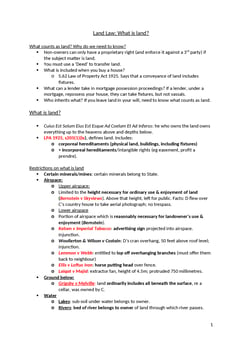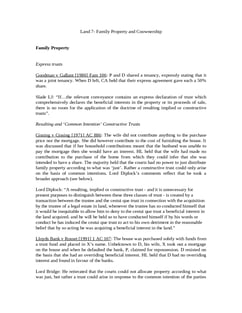Thorner v Major [2009] 1 WLR 776; UKHL 18
Judgement for the case Thorner v Major
Table Of Contents
KEY POINTS
-
The doctrine of proprietary estoppel is based on three elements:
A representation or assurance made to the claimant,
Reliance on it by the claimant, and
Detriment to the claimant in consequence of his reasonable reliance thereto.
An assurance can be inferred from the conduct and words of the party making the representation, even in the absence of an explicit promise.
The crucial factor is whether the claimant reasonably believed that they had a clear and unequivocal assurance regarding their property rights.
FACTS
David Thorner worked without pay on Peter Thorner's farm for nearly 30 years. From 1990 until Peter's death in 2005, Peter’s actuations led David to believe that he would inherit the farm.
David acted in reliance upon this assurance from Peter. In 1990, Peter gave David a bonus related to assurance policies, implying it was for his future inheritance.
Peter initially left the farm to David in his will but destroyed it after a falling out with other legatees. He never made a new will, and as a result, Peter died intestate.
David claimed proprietary estoppel, arguing that he should be entitled to the farm based on his long-term unpaid work and the expectations created by Peter's conduct.
COMMENTARY
This case serves as a significant precedent in the area of proprietary estoppel, emphasising the importance of clear representations or assurances made by the party against whom the claim is brought.
It reaffirms the courts' willingness to protect the legitimate expectations of individuals who have acted in good faith based on assurances regarding property rights.
ORIGINAL ANALYSIS
Defendant implied that he would leave his farm to Plaintiff in his will. Plaintiff had worked for free on Defendant’s land for many years for free, and Defendant had entrusted Plaintiff with money to pay death duties, etc. He entered Plaintiff in his will as implied, but, due to an argument with another relative who stood to inherit a separate asset, tore it up and died intestate.
Plaintiff claimed that he acquired the rights to the farm via proprietary estoppel, and the HL allowed his claim.
Lord Walker
Proprietary estoppel is a means of acquiring rights, but that the agreement had to be ‘sufficiently certain’ (however he did not repeat the claims from Yeoman’s Row v Cobbe that the agreement had to be ‘legally binding’ or ‘binding and irrevocable’).
This is still a high threshold, as in Crabb v Arun DC where negotiations were at a very advanced stage.
RELATED CASES
For Further Study on Thorner v Major

A collection of the best GDL notes the director of Oxbridge Notes (an O...
Need instant answers? Our AI exam tutor is here to help.
Ask questions 🙋 Get answers 📔 It's simple 👁️👄👁️
Our AI is educated by the highest scoring students across all subjects and schools. Join hundreds of your peers today.
Get StartedRelated Product Samples
These product samples contain the same concepts we cover in this case.
| Land Law | Estoppel Notes (10 pages) |
| GDL Land Law | Proprietary Estoppel Notes (8 pages) |
| GDL Land Law | Proprietary Estoppel Notes (4 pages) |

 Since 2010, Oxbridge Notes has been a trusted education marketplace, supplying high-quality materials from top achievers at universities like Oxford, Cambridge, LSE, Harvard, and Yale.
Since 2010, Oxbridge Notes has been a trusted education marketplace, supplying high-quality materials from top achievers at universities like Oxford, Cambridge, LSE, Harvard, and Yale.